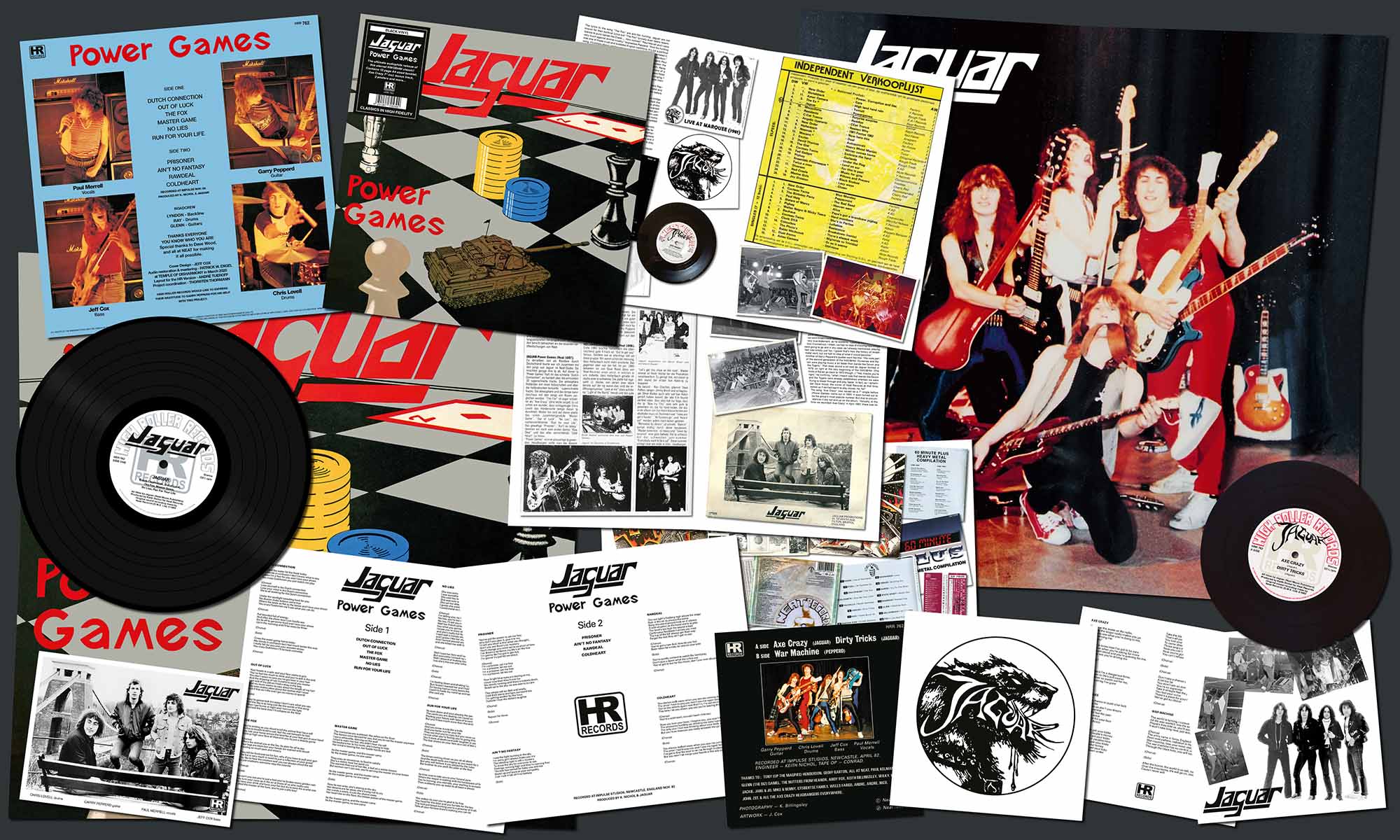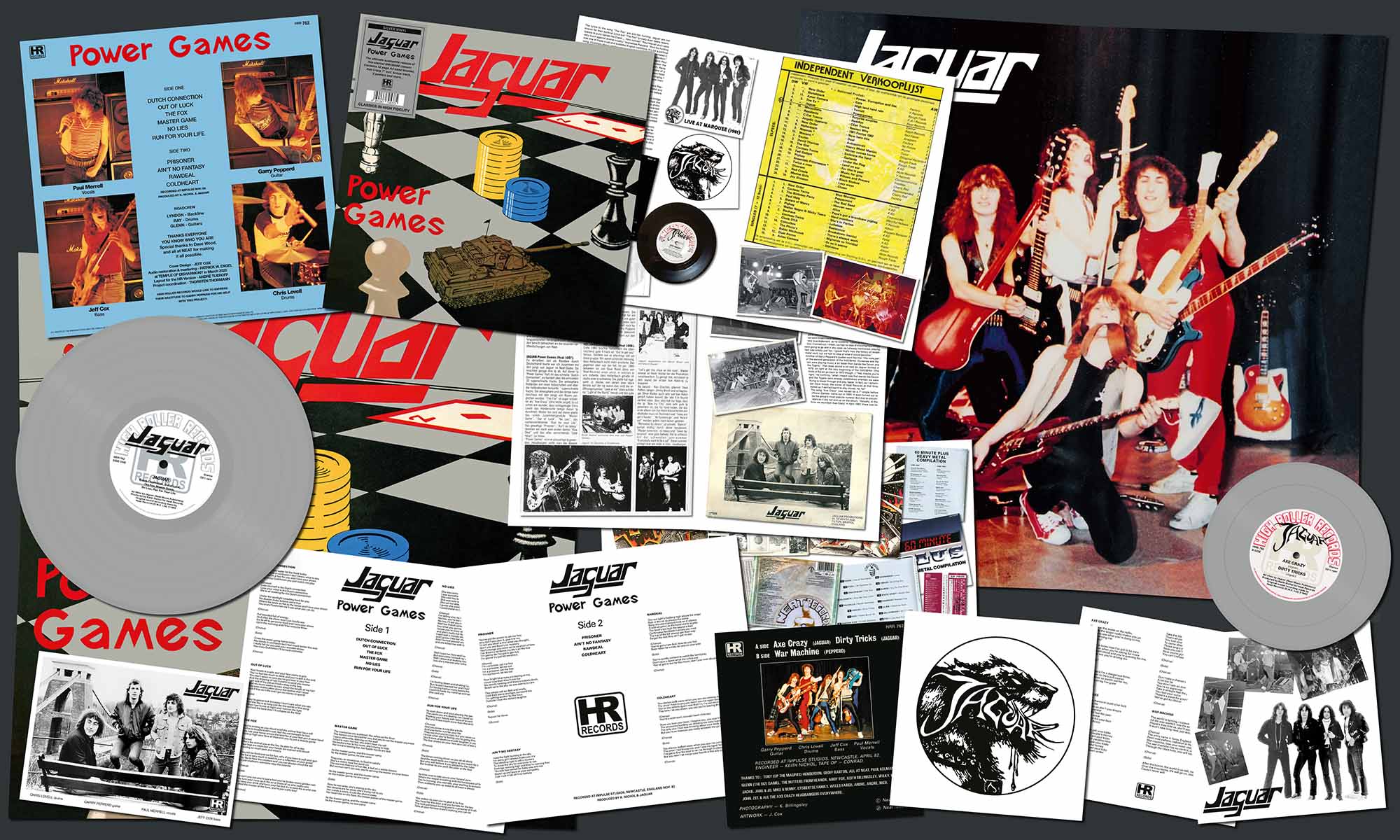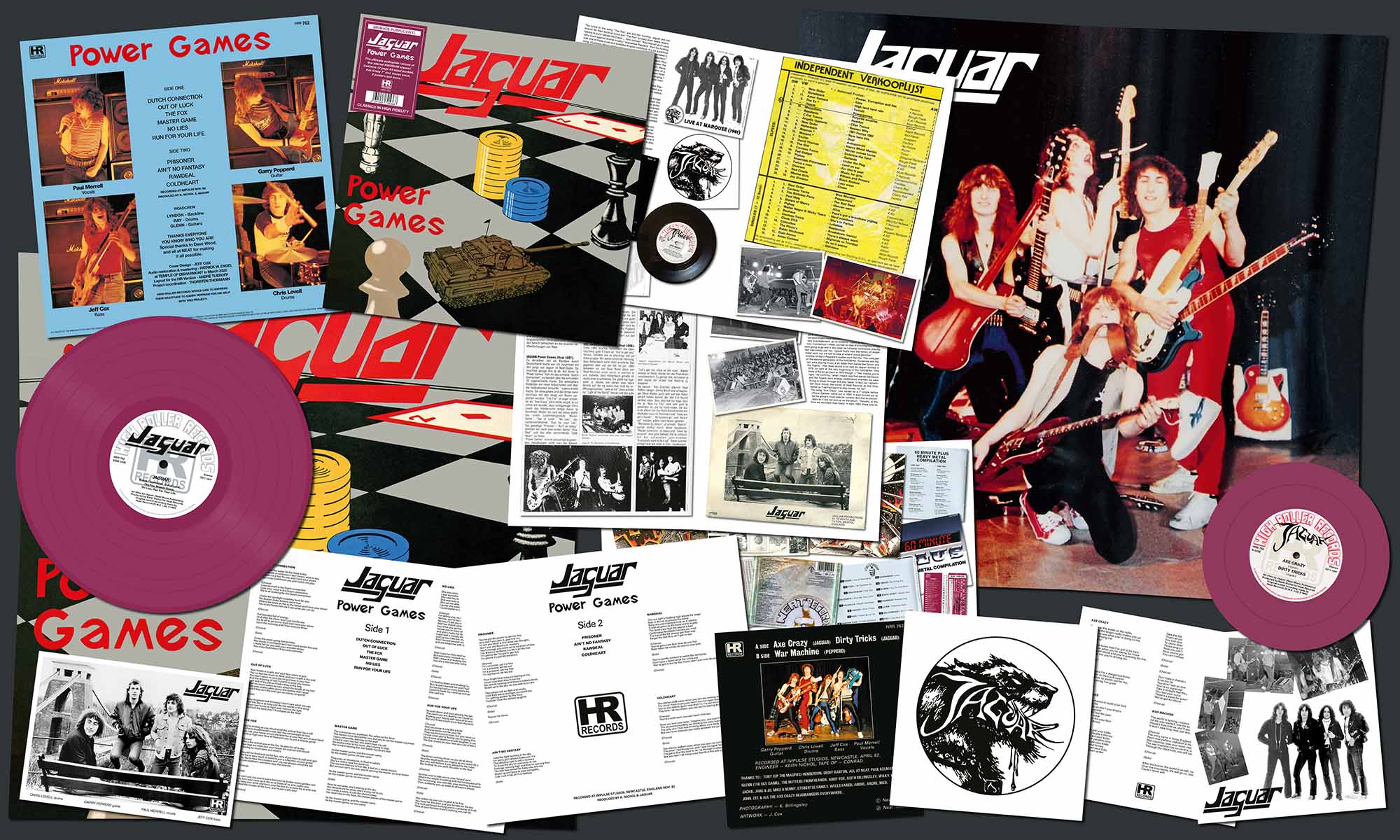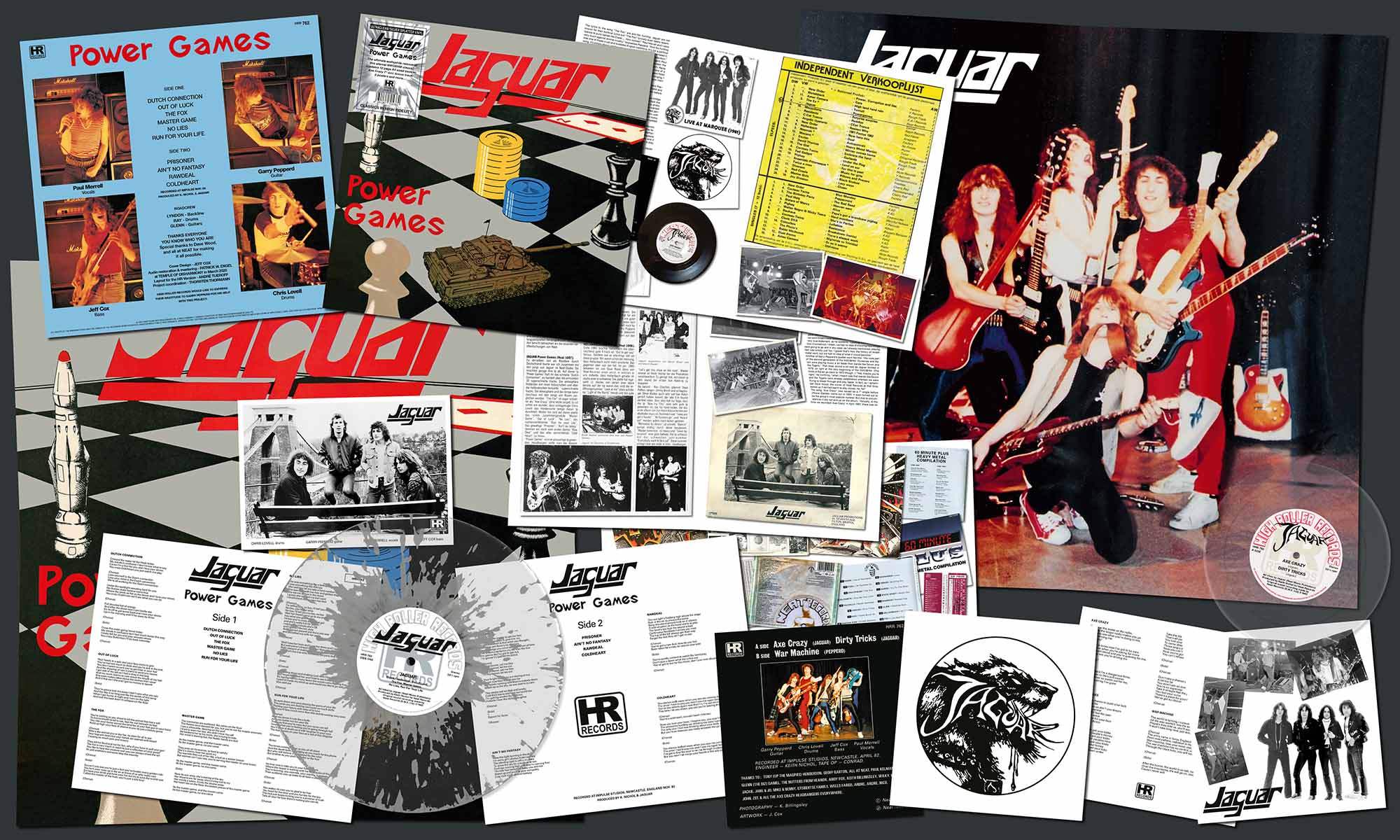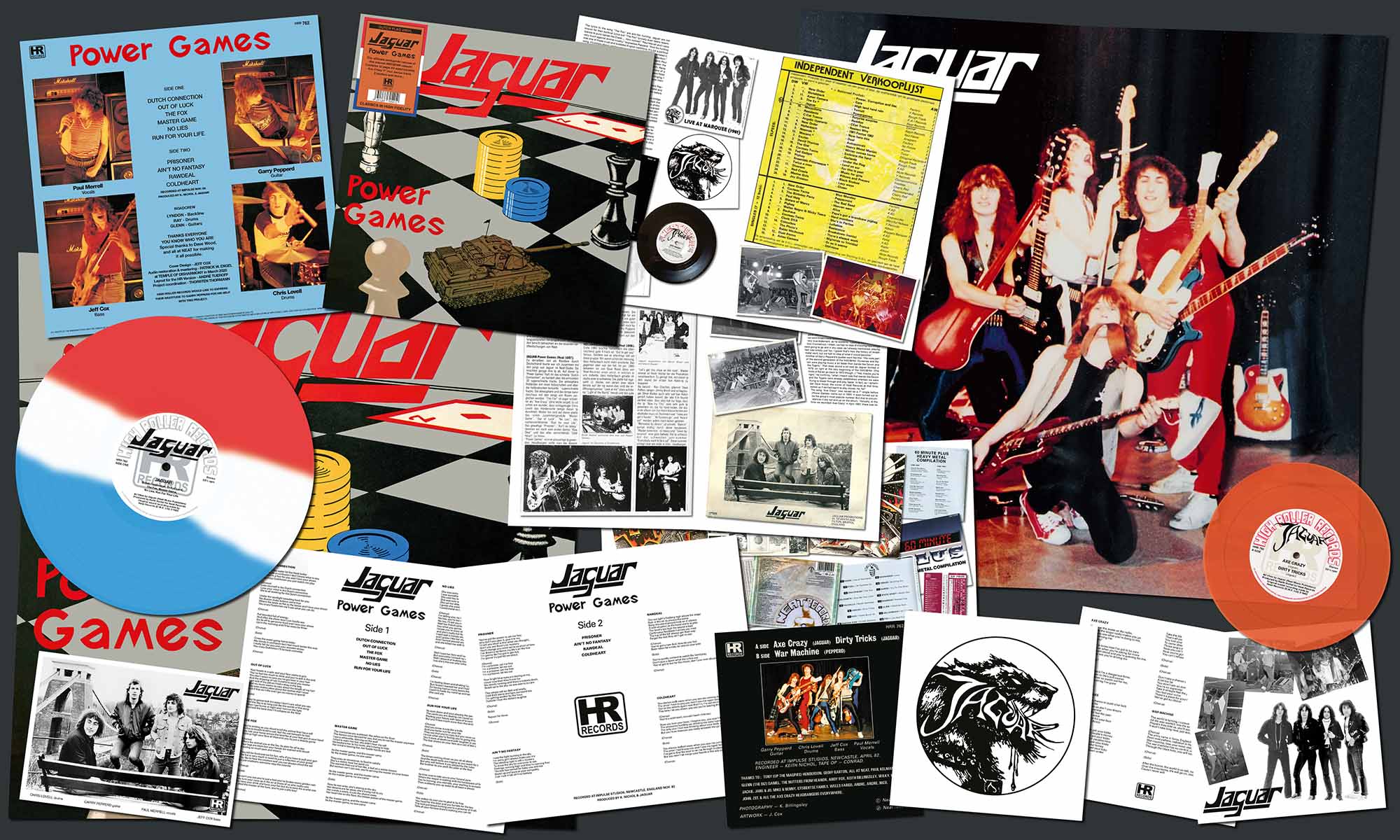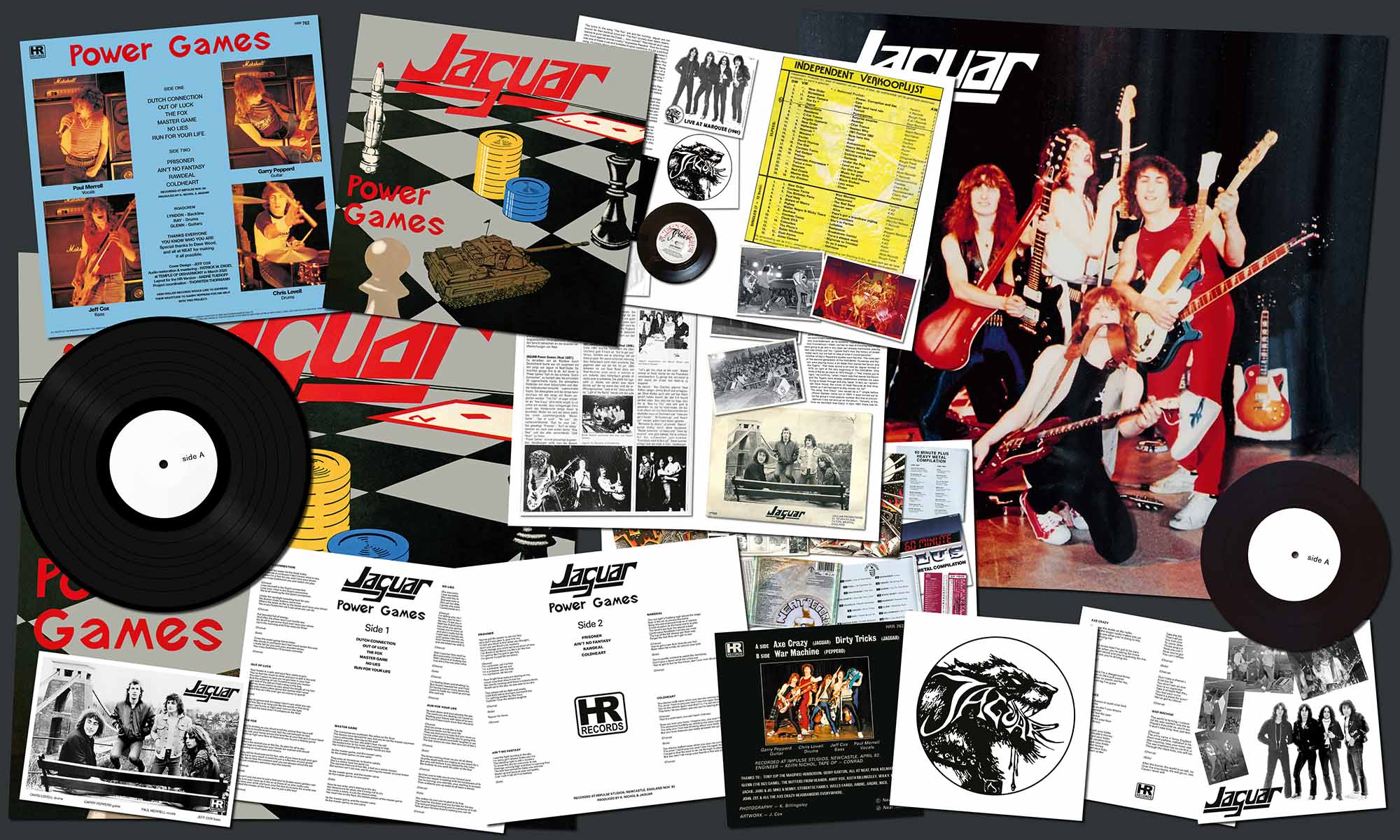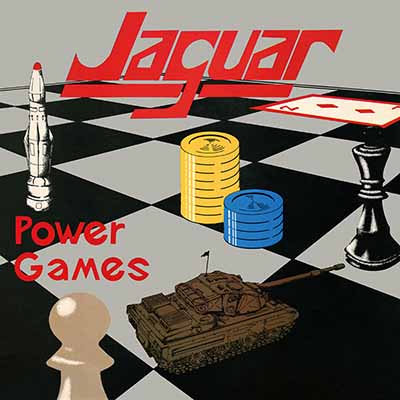 | ||||
| JAGUAR - Power Games LP+7 | |
HRR 762, ltd 1000, 300 x black vinyl, 300 x silver, 200 x purple + 100 transparent ultra clear with silver splatter vinyl(HRR Mailorder exclusive)+ 100 x "dutch flag" vinyl (HRR mailorder exclusive), 425gsm heavy cardboard cover, lyric sheet printed on uncoated paper, 12 page A4 booklet, 2 x poster, bonus 7" with p/s + lyric sheet, A5 photo card | |
| Paul Merrell - Vocals Garry Pepperd - Guitars Jeff Cox - Bass Chris Lovell - Drums | |
| 01 Dutch Connection 02 Out of Luck 03 The Fox 04 Master Game 05 No Lies 06 Run for Your Life 07 Prisoner 08 Ain't No Fantasy 09 Rawdeal 10 Coldheart 11 Axe Crazy 12 Dirty Tricks 13 War Machine | |
LAST COPIES | |
Original transfer, audio restoration and mastering by Patrick W. Engel at TEMPLE OF DISHARMONY in March 2020. Cutting by SST Germany on Neumann machines for optimal quality on all levels...
The ultimate audiophile reissue of this eternal NWOBHM classic! Including original "Run for Your Life" Intro and "Coldheart" Outro!
Some people argue that Jaguar’s legendary »Power Games« début album was the first speed metal album in music history. But where did this “need for speed” come from after all? Was Motörhead the single most important influence for Jaguar regarding pure speed? “I’ve answered this question many times,” answers the band’s long-serving guitarist Garry Pepperd. “As I’ve always said, we simply played fast because it was fun and the faster we played, the more fun it was! We used to have a great time with this in a bedroom in Chris Lovell’s parents’ house way back when we started. We were just kids enjoying ourselves. The speed influence for me came from my love of punk not necessarily Motörhead or any specific band. We loved both, punk and metal and it was fun to play fast. So the two styles got married together, I guess making us what we were.”
Back then in the press Jaguar were sometimes described as “Maiden on speed”, which is news to Mister Pepperd: “Well, I’ve never heard that before but yes, that’s an accurate description of how we were back then, ha, ha!” In addition to that, Pepperd was once quoted as having said: “I suppose you could say we were thrash metal before there was such a thing.” Arguably a very true statement, as he explains: “Looking back on it, that’s how it turned out. I mean, we had no idea of knowing how things were going to go and in any case, as I already mentioned, playing fast was simply just fun. I guess that’s how the history of thrash metal went, but we had no idea of what it would become.”
Another of Garry Pepperd’s quotes went like this: “We were part of the second generation of the NWOBHM. Ourselves and Raven were playing music a bit faster than bands like Saxon and the Tygers.” That does sound a bit odd as Jaguar formed in 1979, so right at the very beginning of the NWOBHM. (The roots of Raven go back to 1973 though...) “Yes, maybe you’re right,” he confirms, “what I meant was that bands like Saxon and the Tygers were already established whereas we were trying to break through and play faster. In fact, as I remember Dave Wood, the owner of Neat Records at that time, asked us if we had learnt to play slower, ha, ha!”
The song “Axe Crazy” was issued as a 7” single before »Power Games« came out in 1983. It soon turned out to be the group’s most popular number. But due to circumstances it did not end up on the album. “Actually, at the time we recorded ‘Axe Crazy’ in April 1982, there was no talk at that point of doing an album with Neat,” explains Garry Pepperd. “We were just going to do the single and see how things went. So, we chose ‘Axe Crazy’ because we felt that it was the best song we had to put out as a single. We chose ‘War Machine’ for the B-side because it was the complete opposite of ‘Axe Crazy’, a much slower tune.” The opening line to “Axe Crazy”, by the way, has been a cause for debate to a few people for quite some years : “You hear the snake on the radio, you say the singer really makes you go.” Does that really refer to David Coverdale in Whitesnake? “Yes, it does,” laughs Pepperd. “Someone I used to know got all excited when they heard a Whitesnake song on the radio, ha, ha!”
Were all the songs on »Power Games« brand new compositions after all? Did the band ever think about re-recording some of your very early songs for »Power Games«? “They were certainly newer compositions, the best of what we had available to record. Some of them were written and played live before we went in to record, none of them were written specifically for the album. We thought about it at the time and some of the songs on the demo had already been re-recorded, 'Stormchild' for the »Heavy Metal Heroes« compilation, 'War Machine' for the B-side of the »Axe Crazy« single so we decided to re-record 'Ain’t No Fantasy' for »Power Games«. We could’ve re-recorded more old songs but decided not to.”
Now, the cover artwork of »Power Games«, whose idea was it? It was heavily influenced by the cold war and the threat of nuclear destruction, wasn’t it? Somehow the reference point for the cover of »Power Games« seems to have been the band’s song “War Machine”... “Jeff Cox did the artwork for »Power Games«, explains Jaguar’s guitarist. “We came up with the idea for the album title together and Jeff went away and came up with the artwork. Well, actually we just thought »Power Games« was a cool title for the album, not really connected to ‘War Machine’ in any way, and the artwork itself was created only to illustrate the title.”
»Power Games« was also issued in a very limited pressing on purple vinyl. Did the band know that, did Neat tell them about it and does Garry own an original purple vinyl copy himself? “I’d heard there was a purple pressing of the album”, is his answer, “but I’d never seen one until I saw fans posting photos of it. I can’t remember if Neat ever told us about it and sadly I don’t have a copy myself but if you do have a spare one, it would be gratefully received, ha, ha!” (Okay, no, I think I’d rather keep my copy...)
The lyrics to the song “The Fox” are anti-fox hunting. Jaguar are not known for their political lyrics but “The Fox” lyrically even bears resemblance to punk bands like Crass … How comes? “Paul Merrell and I were very much against animal cruelty,” expresses Pepperd. “And fox hunting was one of those cruel and outdated English traditions. It’s not a political song, it’s simply about what’s right and wrong and how much we hated it. We felt we had to speak out against it and bring it to people’s attention.”
Between their first and their second single Jaguar changed singers: Paul Merrell replaced Rob Reiss. How big was the difference between the two? Garry explains: “There was a big difference between them. Reiss was more of a traditional metal singer whereas Merrell was more of a bluesy type singer, his hero was always Paul Rodgers. Both singers fitted in well with the band being able to accommodate both styles of singing. I am not aware that fans preferred one or the other, no-one has ever mentioned it to me anyway if they did have a preference.”
Before joining Jaguar, Paul Merrell used to front Stormtrooper and Peppered “managed to see Stormtrooper play a few times around Bristol and that’s how we got to know about Paul. We were friends with him before he joined the band.”
There is this iconic promo photo of Jaguar in front of this famous bridge in the band’s hometown of Bristol. Whose idea was it and who took the photo? “It was our idea,” reveals Pepperd. “We decided to do a photo session in and around the bridge. The band being Bristolian we wanted to show our love and respect for our hometown. I’m not a hundred percent sure but I think the photo was taken by a guy I used to work with called Keith Billingsley. The Clifton Suspension Bridge is indeed an iconic part of Bristol. It was built by Isambard Kingdom Brunel and completed in 1864.”
Like with a lot of other NWOBHM bands (for example Satan or Raven) Holland took Jaguar to its heart almost immediately, especially the famous Dynamo club in Eindhoven. So is it fair to say that the Netherlands became Jaguar’s second home during the 1980s? Garry Pepperd agrees wholeheartedly: “Oh yes, we played there so many times and it was the first country that really took to us. We loved going there to play and still do.”
Matthias Mader
